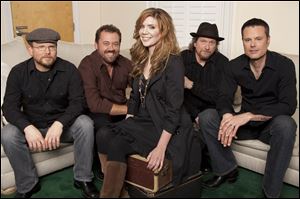
Despite a 7-year break, Alison Krauss, Union Station are getting along just fine
Subhead2
7/22/2011
Alison Krauss, center, poses with Union Station, from left, Ron Block, Dan Tyminski, Krauss, Jerry Douglas, and Barry Bales.
Alison Krauss and her bandmates in Union Station didn't plan a seven-year break between albums. In fact, as they finished their latest effort, "Paper Airplane," they were shocked to realize how long it had been since the triple-Grammy-winning "Lonely Runs Both Ways" (2004).
"We'd recorded and played shows through the last however-many years," Krauss says, "but we were all surprised at the number of years it had been since we made a whole album. We didn't mean for it to be so long. That's just what it ended up being. It's not like we weren't still together as a band."
Quite a bit went on between the band's two albums, of course -- particularly for Krauss, 39, who vaulted to international stardom thanks to "Raising Sand" (2007), a collaboration with former Led Zeppelin singer Robert Plant that went platinum and won six Grammy Awards, including Album of the Year. That kept Krauss occupied for a couple of years, as she and Plant joined "Raising Sand" producer T-Bone Burnett in a tour to support the album.
The other members of Union Station were "incredibly supportive," she says, and banjo/guitarist Ron Block says that Krauss' success was also a triumph for the guys.
"Most of the time she was mentioned, so was Union Station," the 46-year-old Block says in a separate interview. "So the group's name got out there in places that had never heard of us before, I'm sure. Maybe ("Raising Sand") held us up from working together a little bit, but we got something out of it too."
Union Station might have been further delayed by Krauss's work with Plant: The two singers and Burnett began work on a follow-up to "Raising Sand," and Krauss reports that "a number of tracks" were actually recorded. The sessions were scuttled, however, when all three had second thoughts.
"We thought it was premature," Krauss says.
It's not as if Krauss didn't have anything else to do. Union Station, which also includes Dan Tyminski on guitar, mandolin, and co-lead vocals, Barry Bales on bass, and Jerry Douglas on dobro, is hardly a side project. Released in April, "Paper Airplane" debuted at No. 1 on Billboard's country and bluegrass charts and at No. 3 on the Billboard 200, the group's best showing ever. Reviews have been overwhelmingly positive, and the band, which did tour during the between-albums hiatus, is logging strong ticket sales in a flagging concert market.
The group first came together in 1987, when Krauss was 16 and Union Station backed her for her debut album, "Too Late to Cry." She was part of the band for "Two Highways" (1989) and has alternated between Union Station and solo work ever since, winning 26 Grammys -- the most for any female performer -- and earning gold records for Union Station's "So Long So Wrong" (1997), "New Favorite" (2001), and "Lonely Runs Both Ways." ''Live" (2002) went platinum.
Even before "Raising Sand," Krauss enjoyed a high profile as a solo artist via soundtrack performances for the films O Brother, Where Art Thou? (2000) and Cold Mountain (2003). She is not the only member of the band to do solo work, however: Tyminski also appeared on the O Brother, Where Art Thou? soundtrack, rendering Dick Burnett's "Man of Constant Sorrow," while Douglas was an established bluegrass star before joining Union Station in 1998. Bales and Block likewise maintain musical interests outside the group.
Their various outside experiences influenced the making of "Paper Airplane," Krauss believes.
"It had been so long," she explains, "and it just took some kind of scooting around to get back in the saddle. We had all done other projects, and everybody had been producing other things. So, when you get together, it's seven years older and seven more years into your own personality and tastes. And you get older and some people have more fight than they had before. And some people have less. So, if you have those differences and different likes and dislikes ...
"I'll just say that it took a little scooting, some remembering to get back in there."
Sorting out "Paper Airplane's" 11 tracks took some time, including time away from each other. The title track, in fact, came about when Krauss began suffering from severe migraine headaches -- "I was having a hard time judging what we were doing," she recalls -- and broke off the sessions temporarily. During that time she called songwriter Robert Lee Castleman, who was wrestling with writer's block but willing to try to write something for Krauss.
"He said, 'Just come over here and sit here and tell me what's going on with you,'" recalls Krauss, who has a son from her marriage to Pat Bergeson -- they divorced in 2001 -- and was going through a "tough" patch in her life. "So I went over there and, when I walked in the door, he already had a melody. I made a couple of grilled-cheese sandwiches and we talked for about an hour and I went home.
"(Castleman) called me later that night and told me that the title was 'Paper Airplane,' and I was just out of my mind for it."
Krauss considers the album's general tone to be "somber ... not sad, like it's depressing. I think there's an honesty to it that's ... comforting. When you look back, I think this record is about a trial and a time when things are tough, and the thing that you are waiting for is a change. Not that you can see it coming -- you just know that it will, because that is what history has told you."